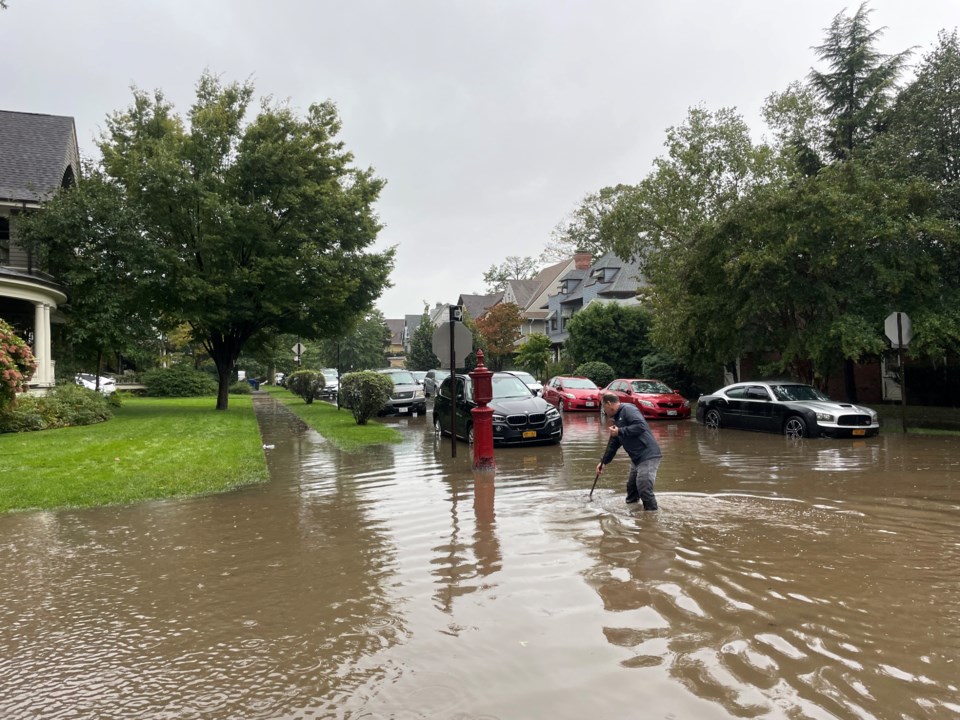From flooded streets and basements to sunken cars, New Yorkers continue to experience the heaviest and destructive rainfall they have ever seen over the past several years. Every time it floods, it seems as if the deluge is described as “a month’s worth of rain.” Weather conditions in the city are increasingly getting worse as it brings to light that the city is facing a serious climate crisis. There is an increase in heat waves, hurricanes and floods that is becoming a threat to Brooklyn and its environment. Climate change is contributing to worsening weather conditions posing a health threat to the underserved communities of Brooklyn.
Brooklyn has been a place I have called home for over the past 13 years. Moving from the Caribbean at a young age, New York summers were always the best feeling for me, as I experienced summer in a new environment. The summer atmosphere is amazing, where I have memories of children running around in the sun, splashing in water from the fire hydrant; ice cream trucks passing by, playing its melodious melodies; and all-day amusement park fun at Coney Island, which I looked forward to every summer break.
However, over the past few years, it’s been quite difficult to enjoy New York summers. Summers are becoming hazy and hot where days are filled with frequent heat waves, making outside not enjoyable anymore. Moreover, just like me, many New Yorkers have realized that there has been a shift in the climates change in the world, especially in Brooklyn.
Climate change has been an evolving threat that has been impacting the world for many years. New York, just like many other places, has been experiencing the worst shift in the change. Who is to blame for the accelerating change in weather conditions? That’s right, humans! According to the New York State Department of Environmental Conservation, human activities from greenhouse gases are the main contributors to climate change and global warming. As a result, weather conditions have exacerbated in the city causing extreme heat temperatures, intense frigid temperatures during the winter and increased precipitation resulting in flooding.
For instance, in September 2023, New York experienced over 12 hours of heavy rain that caused extreme flooding over the five boroughs. Based on a report from the National Environmental Satellite, Data, and Information Service, each borough received a significant amount of rain, but Brooklyn received over seven inches of rain that caused extreme flooding throughout the streets.
In addition to floods, there has been an increase in heat waves during the summer due to consistent hot temperatures. A data collection by the New York City Department of Mental Health and Hygiene showed temperatures in the city averaged from 90 to 100 degrees consistently, and there were multiple heat waves between July and September of 2023.
Moreover, climate change not only impacts the environment, but it also causes health-related illnesses amongst vulnerable populations in underserved communities who are of low income, people of color and elderly people. In fact, they are more susceptible to the health-related illnesses of the climate crisis compared to the general population due to health disparities.
For instance, consider the impact of heat waves on the vulnerable population. According to NYC Mayor’s Office of Climate Change and Environmental Justice, heat waves are expected to worsen by five times by 2080 in New York City, hence, the likelihood of the vulnerable population developing heat related illnesses is going to be higher than it has ever been in the future.
Black people in low-income communities of Brooklyn are at greater risk of exposure due to lack of air conditioning, access to health care and insurance and poor housing quality compared to the white population. Not only are Black people in low-income communities more prone to experiencing effects from heat waves, but Black pregnant women are at risk, too. If pregnant women are exposed to extreme heat, they are at a higher risk of developing high blood pressure and eclampsia. This is disturbing, especially since Black women have a higher maternal mortality rate compared to white and Hispanic women.
As precipitation increases throughout Brooklyn, the impact of floods on the vulnerable population raises concern. Floods can cause vector borne diseases, such as malaria and dengue fever, from stagnant and warm water. Concerns have been raised in terms of elderly individuals who already suffer from chronic health illnesses contracting these diseases due to their immune systems being compromised. Additionally, floods can cause destruction to infrastructure that can ultimately impact access to care and services, especially for vulnerable populations in underserved communities.
The New York State Department of Health is making an initiative in combating the ongoing climate issue and its direct correlation on the health of individuals through the Building Resilience Against Climate Effects project. The goals of this project are to implement preventative measures to lessen the risk of climate change on the health of citizens especially on those who are more prone to being affected by the effects of climate change. This will be beneficial for residents in New York City, especially Brooklyn, who are from low income and minority communities, where policies to combat such issues can help to improve health equity.
As the climate in Brooklyn continues to change, the impact it has on Brooklyn will continue to worsen. We as residents of Brooklyn can work alongside state and local governments to help prevent worsening impacts from climate change on Brooklyn’s environment and its residents. So, it starts with us: let’s make a change and combat climate change!
Kareece Ambris is a graduate student studying Public Health at SUNY Downstate Health Sciences University.




